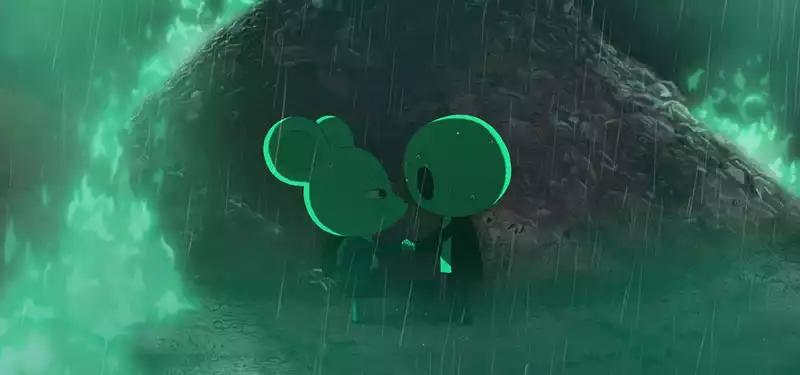Jan 8, 2018
"Everything is relevant: an interview with "Bird Boy" director Pedro Rivero and Alberto Vasquez
A surreal fever dream of pollution and addiction, Alberto Vazquez and Pedro Rivero's arresting Spanish animated feature film, Birdboy: The Forgotten Children, is unlike every other animated feature currently under consideration for an Oscar.
Adapted from Vazquez's graphic novel, Psiconautas, as well as its 2011 short film adaptation - and nodding in the direction of auteurs as different as Hayao Miyazaki and David Lynch - Birdboy is as lived through an anthropomorphized dystopia seemingly without mercy or redemption. It sticks out alongside Disney's feel-good blockbuster Coco and even the independent ambition of GKIDS' own The Breadwinner like a (quite) sore existentialist.
“We know it's probably a very difficult movie for a general audience, but we hope it will have a good reception in North America,” Rivero explained by phone alongside Vazquez during the Animation Is Film festival. “And we also hope it gets a chance at an Oscar nomination.”
Given Vazquez and Rivero's admittedly careful English, difficult is not a word chosen lightly.
Hewing closer to Lynch's experimental feature debut, Eraserhead, than Miyazaki's bleak masterpiece, Nausicaa of the Valley of the Wind, Birdboy does not offer its viewers much in the way of traditional narrative or heroism, relying instead upon fractured psychologies and environments mere steps from madness and barbarity. Yet these (arguably brave) choices do nothing to dilute the film's intensity or impact, which makes for riveting cinema that transcends convention and geography to deliver one of this year's most unique and memorable films.
Birdboy is easily the darkest and, perhaps aside from Sébastien Laudenbach's The Girl Without Hands, most destabilizing of all of the animated feature films contending this season. In the interview that follows with Rivero and Vazquez, we take a deeper look at what the filmmakers aimed to accomplish by making the film.
Cartoon Brew: Can you tell me about how Birdboy: The Forgotten Children came to be-
Pedro Rivero: It's a long story. But the short version is that Alberto created the graphic novel many years ago, and after I read it, I called him. At that point, we decided we would try to adapt it into a feature film, but it's very difficult to find the money to make a movie like this.
How would you explain Birdboy, given how seamlessly it skips from surrealism to science fiction to horror-
Alberto Vazquez: I think it's really a fable. It's a realistic fable of how external matters like pollution and drugs can contaminate the interior of its characters. You know, when I was a teenager, the part of Spain I was living in was a gateway of drugs into Europe. Pedro is from Basque country, and something similar was happening there. So we really tried to tell that story in a complete way in the film, because for us Birdboy is about the suffering of those teenagers.
That interior pollution is alarmingly mirrored by the external environmental destruction.
Pedro Rivero: Yes, certainly. You can look at the film in two ways. On the outside, everything in the world is polluted and contaminated. On the inside, you have characters whose inner demons are threatening to run away from them. So we think that all of its environmental scenes are connected to its characters' passions and ideas. In the final sense, everything is related.
Did you experience environmental pollution growing up-
Alberto Vazquez: Yes, but it's also something we can see now, in every country, as you know. From atomic bombs to factory pollution and more, it's a global problem, so of course we are interested in talking about it.
In terms of interior pollution, what kind of drugs are you talking about-
Pedro Rivero: We weren't necessarily talking about any one particular drug, as all of us, at some time, use some means of escaping reality. In the case of some Birdboy characters, it is pills. In our own society, we often use alcohol. But we think there are many different ways to escape reality.
Alberto Vazquez: Yes, the teenagers smoke dope, and use heroin too. So the film is more general in looking at drugs overall as pollution.
What were some of your influences for the graphic novel and the films-
Alberto Vazquez: There are a lot of them, although some of our influences are very generic. Of course, we like good cinema in general, including the classic films and directors. But for Birdboy, my influences were more to be found within the underground comics and narrative illustration. For example, I like a lot of Roland Topor, an illustrator and designer who wrote and designed Fantastic Planet. And I also like Dave Cooper, the Canadian comic artist.
Pedro Rivero: For cinema, we sometimes reference the films of Hayao Miyazaki, and often David Lynch, especially when we're thinking about sound. But we have a lot of different influences, from novels to cinema to comics.
I definitely feel the Lynchian influence. Birdboy reminds me a lot of Eraserhead.
Pedro Rivero: We really like those kinds of movies. In this film, it was very important for us have viewers feel as if they are stepping into a cinematic world, so that they can feel the problems of its characters. And we think we did that by creating its atmosphere using very intense sound and music.
Birdboy confirms animation can provide unique visions for even live-action audiences, regardless of country of origin…
Pedro Rivero: In some cases, it is very difficult for animation to try to have the same impact as a live-action movie. But we feel animation is able to explore some ideas that are impossible to describe in other films.
Birdboy: The Forgotten Children is currently playing in limited release in U.S. theaters through distributor GKIDS.




Post your comment